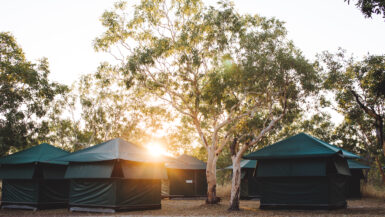Fiji is known for its breathtaking natural beauty, crystal clear waters, and lush green forests. It’s no wonder that camping has become a popular way to experience the country’s stunning landscapes. However, with the increase in tourism, it’s important to choose eco-friendly camping sites to minimize the impact on the environment. Fortunately, Fiji has a range of eco-friendly camping sites that offer a sustainable way to explore the country’s natural wonders. In this article, we’ll explore the best eco-friendly camping sites in Fiji, from remote locations to established campsites. Whether you’re a seasoned camper or a first-timer, these sites offer a unique and sustainable way to experience Fiji’s natural beauty.
Introduction to Eco-Friendly Camping in Fiji
Camping is a great way to connect with nature and explore the beauty of the world. However, traditional camping methods can be harmful to the environment. That’s why eco-friendly camping has become increasingly popular in recent years. Eco-friendly camping, also known as sustainable camping, is a way of camping that is environmentally responsible and sustainable. It involves using eco-friendly camping gear, following Leave No Trace principles, and choosing campsites that have minimal impact on the environment.
In Fiji, eco-friendly camping is becoming more popular as people are becoming more aware of the impact of traditional camping on the environment. There are many eco-friendly camping sites in Fiji that offer a unique and sustainable camping experience. These sites are located in beautiful, natural settings and offer a range of activities such as hiking, swimming, and snorkeling.
In this article, we will explore the best eco-friendly camping sites in Fiji, their features, benefits, and challenges. We will also provide tips on how to camp sustainably in Fiji and discuss the future of eco-friendly camping in Fiji. Our aim is to inspire you to choose eco-friendly camping and make a positive impact on the environment while enjoying the beauty of Fiji.
Top Eco-Friendly Camping Sites in Fiji
Fiji is a beautiful country with breathtaking landscapes, crystal-clear waters, and vibrant culture. It’s no wonder that eco-friendly camping sites are becoming popular in Fiji, as they allow visitors to experience the beauty of Fiji while minimizing their impact on the environment. Here are the top eco-friendly camping sites in Fiji:
1. Navutu Stars Resort
Located on the island of Yaqeta, Navutu Stars Resort offers a unique eco-friendly camping experience. The resort has a range of eco-friendly tents that are made with sustainable materials and powered by solar energy. The tents are located on a secluded beach and offer stunning views of the ocean. Navutu Stars Resort also has a range of sustainable practices, such as composting, recycling, and using organic produce in their restaurant.
2. Korovou Eco-Tour Resort
Korovou Eco-Tour Resort is located on the island of Viti Levu and offers a range of eco-friendly camping options. The resort has a variety of tents, including traditional Fijian bures, which are made with natural materials and powered by solar energy. The resort also has a range of sustainable practices, such as composting, using organic produce in their restaurant, and providing reusable water bottles to guests.
3. Paradise Taveuni
Paradise Taveuni is located on the island of Taveuni and offers a range of eco-friendly camping options. The resort has a variety of tents, including beachfront bures, which are made with sustainable materials and powered by solar energy. The resort also has a range of sustainable practices, such as composting, recycling, and using organic produce in their restaurant. Paradise Taveuni also offers a range of activities, such as hiking, snorkeling, and diving.
4. Barefoot Kuata Island
Barefoot Kuata Island is located on the island of Kuata and offers a range of eco-friendly camping options. The resort has a variety of tents, including beachfront bures, which are made with sustainable materials and powered by solar energy. The resort also has a range of sustainable practices, such as composting, recycling, and using organic produce in their restaurant. Barefoot Kuata Island also offers a range of activities, such as hiking, snorkeling, and diving.
These eco-friendly camping sites in Fiji offer a unique and sustainable camping experience. They’re located in beautiful, natural settings and offer a range of activities for visitors to enjoy. By choosing an eco-friendly camping site in Fiji, visitors can make a positive impact on the environment while enjoying the beauty of Fiji.
Features of Eco-Friendly Camping Sites in Fiji
Eco-friendly camping sites in Fiji are designed to minimize the impact on the environment while providing visitors with a unique and sustainable camping experience. Here are some of the features of eco-friendly camping sites in Fiji:
1. Sustainable Accommodation
Eco-friendly camping sites in Fiji offer a range of sustainable accommodation options, such as tents, bures, and cabins. These accommodations are designed with sustainable materials and are powered by renewable energy sources such as solar power. They are also designed to blend in with the natural environment and offer visitors a unique and authentic camping experience.
2. Sustainable Practices
Eco-friendly camping sites in Fiji follow sustainable practices such as composting, recycling, and reducing waste. They also use organic produce in their restaurants and provide guests with reusable water bottles to minimize the use of single-use plastics. By following sustainable practices, eco-friendly camping sites in Fiji minimize their impact on the environment and promote sustainable living.
3. Natural Setting
Eco-friendly camping sites in Fiji are located in beautiful, natural settings such as secluded beaches, lush rainforests, and crystal-clear waters. These natural settings provide visitors with a unique and authentic camping experience while allowing them to connect with nature and appreciate the beauty of Fiji.
4. Range of Activities
Eco-friendly camping sites in Fiji offer a range of activities such as hiking, snorkeling, and diving. These activities allow visitors to explore the natural beauty of Fiji and appreciate its unique flora and fauna. By providing a range of activities, eco-friendly camping sites in Fiji promote sustainable tourism and encourage visitors to connect with nature.
In conclusion, eco-friendly camping sites in Fiji offer a unique and sustainable camping experience. They are designed to minimize the impact on the environment while providing visitors with a range of sustainable accommodation options, following sustainable practices, and offering a range of activities in beautiful, natural settings. By choosing an eco-friendly camping site in Fiji, visitors can make a positive impact on the environment while enjoying the beauty of Fiji.
Benefits of Eco-Friendly Camping in Fiji
Eco-friendly camping in Fiji offers a range of benefits, both for visitors and the environment. Here are some of the benefits of eco-friendly camping in Fiji:
1. Minimizes Environmental Impact
Eco-friendly camping sites in Fiji are designed to minimize the impact on the environment. They follow sustainable practices such as composting, recycling, and reducing waste. They also use renewable energy sources such as solar power and provide visitors with reusable water bottles to minimize the use of single-use plastics. By choosing an eco-friendly camping site in Fiji, visitors can minimize their impact on the environment and promote sustainable living.
2. Connects Visitors with Nature
Eco-friendly camping sites in Fiji are located in beautiful, natural settings such as secluded beaches, lush rainforests, and crystal-clear waters. By choosing an eco-friendly camping site in Fiji, visitors can connect with nature and appreciate the beauty of Fiji. They can also participate in a range of activities such as hiking, snorkeling, and diving to explore the natural beauty of Fiji.
3. Unique and Authentic Experience
Eco-friendly camping sites in Fiji offer a unique and authentic camping experience. They provide visitors with a range of sustainable accommodation options, such as tents, bures, and cabins, which are designed with sustainable materials and powered by renewable energy sources. By choosing an eco-friendly camping site in Fiji, visitors can experience a unique and authentic camping experience while minimizing their impact on the environment.
4. Promotes Sustainable Tourism
By choosing an eco-friendly camping site in Fiji, visitors can promote sustainable tourism. Eco-friendly camping sites in Fiji follow sustainable practices and minimize their impact on the environment. They also promote sustainable living and encourage visitors to connect with nature. By promoting sustainable tourism, eco-friendly camping sites in Fiji contribute to the long-term sustainability of Fiji’s natural beauty and culture.
In conclusion, eco-friendly camping in Fiji offers a range of benefits, including minimizing environmental impact, connecting visitors with nature, providing a unique and authentic camping experience, and promoting sustainable tourism. By choosing an eco-friendly camping site in Fiji, visitors can make a positive impact on the environment while enjoying the beauty of Fiji.
Tips for Eco-Friendly Camping in Fiji
Eco-friendly camping in Fiji is a great way to explore the natural beauty of Fiji while minimizing your impact on the environment. Here are some tips for eco-friendly camping in Fiji:
1. Bring Eco-Friendly Camping Gear
When packing for your eco-friendly camping trip in Fiji, make sure to bring eco-friendly camping gear. This includes reusable water bottles, rechargeable batteries, and solar-powered lanterns. By using eco-friendly camping gear, you can minimize your impact on the environment and promote sustainable living.
2. Use Sustainable Transportation
When traveling to your eco-friendly camping site in Fiji, try to use sustainable transportation such as public transportation or carpooling. This can reduce your carbon footprint and minimize the impact on the environment.
3. Follow Leave No Trace Principles
When camping in Fiji, it’s important to follow Leave No Trace principles. This includes packing out all trash, staying on designated trails, and respecting wildlife and other visitors. By following Leave No Trace principles, you can minimize your impact on the environment and ensure that future visitors can enjoy the beauty of Fiji.
4. Choose Eco-Friendly Camping Sites
When choosing a camping site in Fiji, choose an eco-friendly camping site that follows sustainable practices and minimizes its impact on the environment. This can include using renewable energy sources, composting, and recycling.
5. Support Local Businesses
When camping in Fiji, try to support local businesses by purchasing local food and souvenirs. This can promote sustainable tourism and support the local economy.
In conclusion, eco-friendly camping in Fiji can be a rewarding and sustainable experience. By following these tips, you can minimize your impact on the environment and promote sustainable living. Remember to choose eco-friendly camping sites, bring eco-friendly camping gear, follow Leave No Trace principles, use sustainable transportation, and support local businesses. Enjoy the beauty of Fiji while making a positive impact on the environment.
Challenges of Eco-Friendly Camping in Fiji
While eco-friendly camping in Fiji offers a range of benefits, there are also some challenges that need to be addressed. Here are some of the challenges of eco-friendly camping in Fiji:
1. Limited Access to Resources
Eco-friendly camping sites in Fiji may have limited access to resources such as water and electricity. This can be challenging for visitors who are used to having access to these resources. However, by using eco-friendly camping gear and following sustainable practices, visitors can minimize their use of resources and make the most of what is available.
2. Limited Infrastructure
Eco-friendly camping sites in Fiji may have limited infrastructure, such as roads and facilities. This can make it challenging for visitors to access the site and may limit the range of activities that are available. However, by choosing an eco-friendly camping site that is accessible and has a range of activities, visitors can still enjoy the beauty of Fiji.
3. Limited Awareness
There may be limited awareness of eco-friendly camping in Fiji, which can make it challenging for visitors to find eco-friendly camping sites and understand the importance of sustainable camping practices. However, by promoting sustainable tourism and educating visitors about eco-friendly camping, awareness can be increased and more visitors can be encouraged to choose eco-friendly camping sites in Fiji.
4. Limited Local Support
Eco-friendly camping sites in Fiji may have limited local support, which can make it challenging for them to operate and maintain sustainable practices. However, by supporting local businesses and promoting sustainable tourism, visitors can contribute to the local economy and encourage more local support for eco-friendly camping sites in Fiji.
In conclusion, while there are some challenges to eco-friendly camping in Fiji, they can be addressed by using eco-friendly camping gear, choosing accessible eco-friendly camping sites, promoting sustainable tourism, and supporting local businesses. By addressing these challenges, eco-friendly camping in Fiji can continue to grow and provide visitors with a unique and sustainable camping experience.





Leave a reply